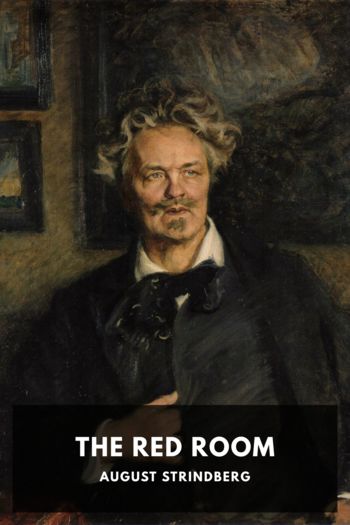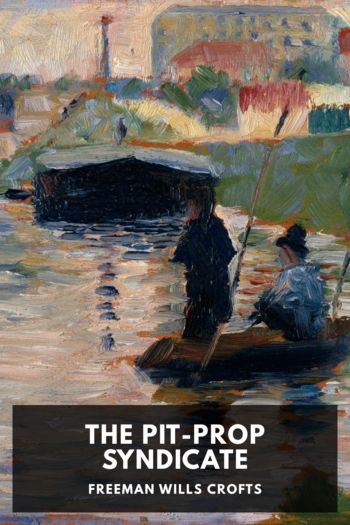The Red Room by August Strindberg (ready player one ebook TXT) 📕

- Author: August Strindberg
Book online «The Red Room by August Strindberg (ready player one ebook TXT) 📕». Author August Strindberg
“I have lost the illusion that the cause of the oppressed lies in good hands, and I think it would be a splendid mission to enlighten the people on the value of public opinion—especially printed public opinion—and its origin; but I shall never abandon the cause.”
The door to the inner room opened again, and the editor came out. He stood still in the middle of the office and said, in an unnaturally conciliatory voice, almost politely:
“I want you to look after the office for a day, Mr. Falk. I have to go away on important business. Mr. Ygberg will assist you so far as the daily business is concerned. His Lordship will be using my room for a few minutes. I hope, gentlemen, you will see that he has everything he wants.”
“Oh, please don’t trouble,” came the Count’s voice from inside the room, where he was sitting bent over a manuscript.
The editor went and, strange to say, two minutes later the Count went also; he had waited just long enough to avoid being seen in the company of the editor of the Workman’s Flag.
“Are you sure that he’s gone?” asked Ygberg.
“I hope so,” said Falk.
“Then I’ll go and have a look at the market. By the by, have you seen Beda since?”
“Since when?”
“Since she left the café and went to live in a room by herself.”
“How do you know she did?”
“Do control your temper, Falk. You’ll never get on in the world unless you do.”
“Yes, you’re right. I must take matters more calmly, or else I’ll go out of my mind! But that girl, whom I loved so dearly! How shamefully she has treated me! To give to that clumsy boor all she denied to me! And then to have the face to tell me that it proved the purity of her love for me!”
“Most excellent dialectics! And she is quite right too, for her first proposition is correct. She does love you, doesn’t she?”
“She’s running after me, anyhow.”
“And you?”
“I hate her with all my soul, but I am afraid to meet her.”
“Which proves that you are still in love with her.”
“Let’s change the subject!”
“You really must control yourself, Falk! Take an example from me! But now I’ll go and sun myself; one should enjoy life as much as possible in this dreary world. Gustav, you can go and play buttons for an hour, if you like.”
Falk was left alone. The sun threw his rays over the steep roof opposite and warmed the room; he opened the window and put out his head for a breath of fresh air, but he only breathed the pungent odours of the gutter. His glance swept the street on the right and far away in the distance he saw a part of a steamer, a few waves of the Lake of Mälar glittering in the sunlight, and a hollow in the rocks on the other side, which were just beginning to show a little green here and there. He thought of the people whom that steamer would take into the country, who would bathe in those waves and feast their eyes on the young green. But at this moment the whitesmith below him began to hammer a sheet of iron, so that house and window panes trembled; two or three labourers went by with a rattling, evil-smelling cart, and an odour of brandy, beer, sawdust, and pine-branches poured out of the inn opposite. He shut the window and sat down at his table.
Before him lay a heap of about a hundred provincial papers, from which it was his task to make cuttings. He took off his cuffs and began to look through them. They smelt of oil and soot and blackened his hands—that was their principal feature. Nothing he considered worthy of reprinting was of any use, for he had to consider the programme of his paper. A report to the effect that the workmen of a certain factory had given the foreman a silver snuffbox had to be cut out; but the notice of a manufacturer having given five hundred crowns to his workingmen’s funds had to be ignored. A paragraph reporting that the Duke of Halland had handselled a pile-driver, and Director Holzheim celebrated the event in verses, had to be cut out and reproduced in full “because the people liked to read this kind of thing”; if he could add a little biting sarcasm, all the better, for then “they were sure to hear about it.”
Roughly speaking, the rule was to cut out everything said in favour of journalists and working men and everything depreciating clergymen, officers, wholesale merchants (not retail), the professions, and famous writers. Moreover, at least once a week, it was his business to attack the management of the Royal Theatre, and severely criticize the frivolous musical comedies produced in the Little Theatre, in the name of morality and public decency—he had noticed that the working men did not patronize these theatres. Once a month the town councillors had to be accused of extravagance. As often as opportunity arose the form of government, not Government itself, had to be assailed. The editor severely censored all attacks on certain members of Parliament and ministers. Which? That was a mystery unknown to even the editor; it depended on a combination of circumstances which only the secret proprietor of the paper could deal with.
Falk worked with his scissors until one of his hands was black. He had frequent recourse to the gum-bottle, but the gum smelt sour and the heat in the room was stifling. The poor aloe, capable of enduring thirst like a camel, and patiently receiving countless stabs from an irritated steel-nib, increased the terrible resemblance to a desert. It had been stabbed until it was covered with black wounds; its leaves shot, like a bundle of donkeys’ ears out of the parched mould. Falk probably had a vague consciousness of something of this sort, as he sat, plunged in thought, for before he





Comments (0)